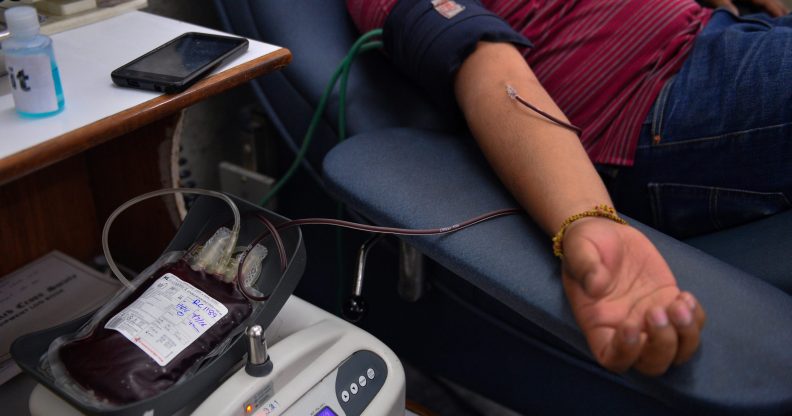Gay and bisexual men barred from donating blood plasma in UK coronavirus trials

Gay and bisexual men are unable to donate plasma for coronavirus trials (Chandan Khanna/AFP/ Getty)
Gay and bisexual men in the UK are reportedly being excluded from a new blood plasma trial to help treat coronavirus.
The potential COVID-19 treatment being trialled at London’s Guy’s and St Thomas’ hospital is known as convalescent plasma, and uses blood plasma from patients that have recovered from the virus.
But critical care manager Andy Roberts told ITV News that he was turned down for the coronavirus trials, even though he had tested positive for the virus and recovered.
Roberts said he was refused at the end of a 20-minute phone call in which he was asked about his sexuality. He was then informed that he couldn’t donate plasma due to being in a same-sex relationship.
The restrictions follow current Department of Health guidelines on blood donation, which state that men who have sex with men are ineligible to donate blood unless they remain celibate for three months.
Roberts’ partner Keith Ward told the broadcaster: “It makes me feel very angry. We have been together in a monogamous relationship for more than 30 years and I previously didn’t know of this outrageous three month rule.
“It only goes to show that in the UK being gay is still thought as a form of contamination, so if you’re straight and sleep with a different person every weekend it’s safer according to [the rules].”
Laura Russell, director of policy at Stonewall, said: “It’s really upsetting that gay and bi men who want to help in the fight against coronavirus are being prevented from doing so.
“The decision on whether people should be able to give blood or plasma should be based on individual risk assessments, not on people’s sexual orientation.”

The coronavirus trials using blood plasma are being held at Guy’s and St Thomas’ hospital in London (Getty)
Department of Health guidelines state that “men who have sex with men are at an increased risk of acquiring certain infections through sex”, which could potentially be passed on during a transfusion.
Such restrictions were first put in place at the height of the HIV/AIDS crisis – but with the HIV risk now minimal and advanced blood screening technology making it much easier to test for the virus, many argue that these restrictions are now redundant.
LGBT+ advocates have long campaigned for the “discriminatory” deferral period to be removed entirely, with the US Blood Equality initiative warning that sexuality-based donor restrictions “reinforce negative stereotypes about gay and bisexual people – particularly that AIDS and HIV is a ‘gay disease.'”
Changing blood donor screening criteria to gender-neutral method based on an individual risk assessment of sexual behaviours has been proven to be safe and feasible, and has already been adopted in Spain, Italy, and Portugal.
A spokesman for the NHS Blood and Transplant service suggested that the UK could be moving towards this form of donor screening in future, although this will not affect the coronavirus trials.
They told the Standard: “We will initially be using the current donor selection guidelines although we will keep this under review. The guidelines are there to protect the health of the donor and the recipient.
“Under the current guidelines, men must wait three months after having oral or anal sex with another man. We appreciate this deferral can feel disappointing if you want to save lives.
“Separately to the convalescent plasma trial, we are working with LGBT+ groups to explore whether we might be able to introduce a more individualised risk assessment for blood donation.”

